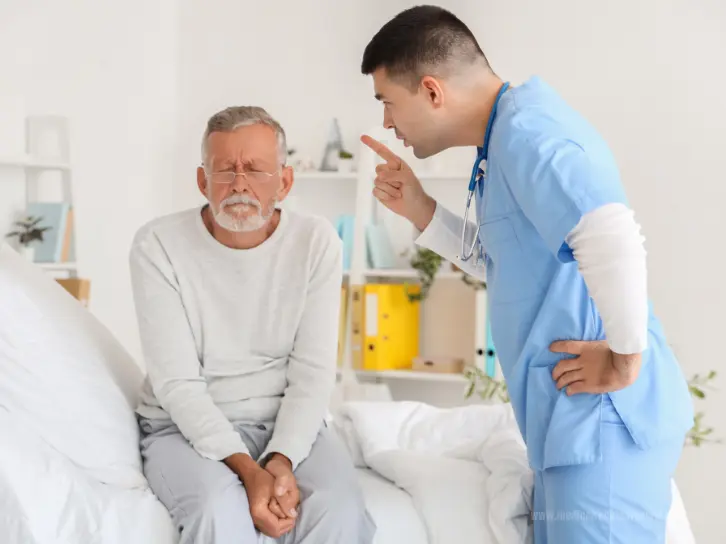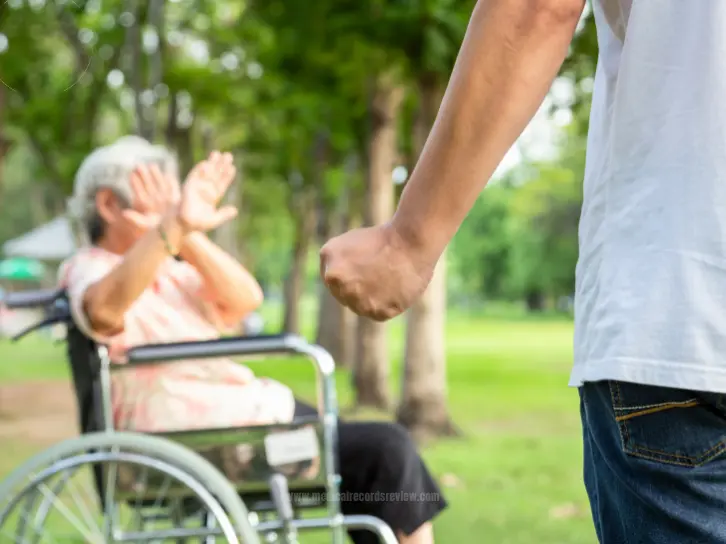Introduction
Many old people are affected by nursing home abuse, which is a serious issue. They usually envisage receiving exceptional care and affection upon entering into these places. However, sometimes medical negligence can cause severe physical injuries as well as emotional torments. This article highlights one among many sickening case studies that link nursing home abuses to medical malpractices.
- Quality care for elderly patients is not just a matter of comfort but a critical necessity.
- Medical negligence can lead to severe consequences such as infections, pressure ulcers, and even death.
- It is essential for families, caregivers, and healthcare professionals to understand these issues.
What is Nursing Home Abuse?
Nursing home abuse refers to the mistreatment of patients residing in long-term care facilities. This mistreatment can take various forms, including:
- Physical Abuse: Inflicting physical pain or injury through actions such as hitting, slapping, or improper use of restraints.
- Sexual Abuse: Any non-consensual sexual contact or behavior.
- Emotional Abuse: Actions that inflict mental pain, anguish, or distress, such as verbal assaults, threats, or harassment.
- Financial Abuse: Illegal or unauthorised use of a resident’s funds, property, or assets.
It is important to be acquainted with these categories so as to identify and solve the problem of abuse. Physical abuse may come in the form of inexplicable wounds or frequent admissions while emotional abuse might show itself through sudden alterations in behaviour or withdrawal from society and friends. Financial abuse frequently entails unauthorised transactions or missing personal effects.
Additionally, inadequate attention leading to health complications such as untreated bed sores and infections caused by neglect falls within the category of nursing home abuses. This type of cruelty can be termed as ‘hidden horror’ because it may not be visible upfront but its effects on health tend to be very detrimental over time.
The first step towards securing safety and wellness for nursing homes inhabitants begins with recognizing these types of abuse.
Who is Responsible for Elder Abuse?
Determining responsibility in cases of nursing home abuse can be complex. Accountability often falls on several parties, including:
- Physicians: They are responsible for diagnosing and prescribing appropriate treatment plans. Failure to provide proper medical oversight can lead to severe health complications.
- Nursing Staff: These frontline caregivers must adhere to care plans and medical instructions. Neglecting tasks like repositioning immobile patients or conducting regular skin assessments directly impacts resident health.
- Care Providers: This includes administrative staff and facility managers who ensure that the nursing home operates within legal and ethical guidelines. Poor management practices can result in systemic neglect.
The suffering of the earlier mentioned woman with disability was caused by combination of medical practitioners’ overlooking, nursing staff negligence and inadequate care providers supervision. This illustrates the need for a comprehensive approach toward nursing home residents’ welfare monitoring.
Types of Nursing Home Abuse Cases:
Nursing home abuse can take many forms, including:
- Sexual abuse in assisted living facilities
- Physical abuse in nursing home
- Emotional abuse in nursing home
- Financial exploitation
- Nursing Home Neglect
- Pressure ulcers
- Falls
- Poor hygiene maintenance
- Failure to administer medications on time
- Failure to provide therapy on time
- Verbal abuse
- Psychological abuse
- Isolation
- Restraint use
- Medication errors
- Inadequate nutrition and hydration
- Inadequate wound care
- Inadequate pain management
Common Signs of Nursing Home Abuse:
- Unexplained injuries or bruises
- Unexplained weight loss or malnutrition
- Unexplained changes in behaviour or mood
- Unexplained changes in sleep patterns
- Unexplained changes in appetite
- Unexplained changes in hygiene or grooming
- Unexplained changes in mobility or ability to perform daily tasks
- Unexplained changes in medication or treatment plans
- Unexplained changes in financial situation or assets
Appendix:
The following is a list of common consequences of nursing home abuse:
- Physical injuries
- Emotional trauma
- Financial exploitation
- Poor health outcomes
- Decreased quality of life
The following is a list of common risk factors for nursing home abuse:
- Age
- Dementia
- Disability
- Social isolation
- Lack of family support
- History of abuse or neglect
Legal Rights of Nursing Home Residents
Knowing how to recognize possible signs of abuse in a nursing home is essential for early intervention. By noticing these indications, family members and close friends are able to act accordingly in order to guarantee safety of their loved ones and protect their legal rights within such institutions.
Nursing Home Safety Standards
Nursing home safety standards and regulations are in place to protect residents from abuse and neglect. If you suspect that a loved one is being mistreated in a nursing home, it is important to know their legal rights. Residents have the right to:
- Receive proper medical care and attention
- Be treated with dignity and respect
- Live in a safe, clean, and comfortable environment
- Make their own decisions about healthcare, unless deemed incompetent
- Have access to their medical records
- Be free from physical, mental, and emotional abuse
- Voice grievances without fear of retaliation
You can help secure the safety and well-being of your loved one by taking steps against abuse from nursing homes. You should consult with an experienced attorney who specializes in nursing home abuse cases to understand your options under law, as well as that will give you a chance for justice for the victim.
Reporting Procedures for Nursing Home Abuse
If you notice any signs that make you believe that someone is not being taken care of properly at the place where they live because they are too old or sick to take care of themselves, it’s probably better if you do something about it. In this case, start documenting any evidence showing that there is neglect or abuse like unexplained bruises or sores on her body; poor personal hygiene; sudden changes in behavior or personality among others. Then inform the administration of the facility about your suspicions and notify Adult Protective Services or local law enforcement should further investigation be required.
Another option is to consult a nursing home abuse specialist who is an experienced attorney. Legal processes will be simplified and you will be helped in gathering evidence and your loved one’s rights will be fought for by this expert. Because doing so protects against further incidents of such nature happening to anyone else, remember that taking legal action against elder abuse in nursing homes safeguards the well-being of the elderly.
Case Scenario:
In May 2022, a 63-year-old elderly female patient with dementia as well as Alzheimer was admitted into a nursing home. The first assessments ruled out pressure ulcer risk on this patient; nevertheless, lack of care ultimately led to stage II pressure ulcers on her sacral area. Consequently, the patient has undergone several wound debridement treatments with a poor prognosis.
Necessities to Follow by Nursing Staff/Nursing Home Facilities:
To prevent nursing home abuse and ensure quality care, nursing staff and facilities must:
- Conduct appropriate admission screenings and physical examinations
- Conduct detailed investigations, such as lab tests and X-rays, as needed
- Maintain proper hygiene to prevent infectious diseases
- Administer medications as advised by physicians
- Turn and reposition patients regularly to prevent pressure ulcers
- Provide necessary treatments and follow-up care
- Create a safe environment to prevent falls
- Take immediate action when necessary
- Explain patient care to caregivers and family members
- Maintain proper nutrition
- Provide emotional support and social interaction
- Monitor for signs of abuse or neglect
Remember:
- Consulting a lawyer specialising in elder abuse can provide insights into legal recourse.
- Medical professionals can offer guidance on appropriate care standards and necessary interventions.
Always prioritise the health and safety of loved ones by seeking professional advice tailored to your specific situation.
World Health Organization’s Key Facts:
- Around 1 in 6 people 60 years and older experience some form of abuse in community settings each year.
- Rates of abuse of older people are high in institutions such as nursing homes and long-term care facilities.
- Abuse of older people can lead to serious physical injuries and long-term psychological consequences.
- Abuse of older people is predicted to increase as many countries experience rapidly ageing populations.
Conclusion
To ensure that elderly patients are receiving high quality healthcare, it is imperative that responsibility be placed upon both caregivers and their employers/medical institutions. This case study has shown how medical malpractice can result in serious health complications as well as significant psychological suffering to victims and their relatives.
To prevent abuse:
- Implement stringent care protocols
- Ensure regular staff training
- Maintain thorough documentation
Not only is good treatment mandated by law, but also morality demands it. By being watchful and taking initiative, you will be able to protect those who are living in the nursing homes.
References:
- World Health Organization. (2022). Tackling Abuse of Older People: Five Priorities for the UN Decade of Healthy Ageing (2021-2030).
- National Institute on Aging. (2022). Elder Abuse.



